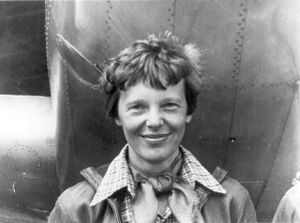Amelia Earhart (nonfiction): Difference between revisions
No edit summary |
No edit summary |
||
| (One intermediate revision by the same user not shown) | |||
| Line 10: | Line 10: | ||
<gallery> | <gallery> | ||
File:Henrietta Bolt.jpg|link=Henrietta Bolt|1936: Engineer and alleged time-traveler [[Henrietta Bolt]] repairs engine for Amelia Earhart, gets Amelia's autograph. | |||
</gallery> | </gallery> | ||
| Line 25: | Line 26: | ||
[[Category:Nonfiction (nonfiction)]] | [[Category:Nonfiction (nonfiction)]] | ||
[[Category:Aviators (nonfiction)]] | [[Category:Aviators (nonfiction)]] | ||
[[Category:Flight (nonfiction)]] | |||
[[Category:People (nonfiction)]] | [[Category:People (nonfiction)]] | ||
[[Category:Writers (nonfiction)]] | [[Category:Writers (nonfiction)]] | ||
Latest revision as of 09:00, 21 November 2017
Amelia Mary Earhart (/ˈɛərhɑːrt/; July 24, 1897 – disappeared July 2, 1937) was an American aviation pioneer and author. Earhart was the first female aviator to fly solo across the Atlantic Ocean. She received the U.S. Distinguished Flying Cross for this accomplishment.
She set many other records, wrote best-selling books about her flying experiences and was instrumental in the formation of The Ninety-Nines, an organization for female pilots.
In 1935, Earhart became a visiting faculty member at Purdue University as an advisor to aeronautical engineering and a career counselor to women students. She was also a member of the National Woman's Party and an early supporter of the Equal Rights Amendment.
During an attempt to make a circumnavigational flight of the globe in 1937 in a Purdue-funded Lockheed Model 10 Electra, Earhart disappeared over the central Pacific Ocean near Howland Island. Fascination with her life, career and disappearance continues to this day.
In the News
1936: Engineer and alleged time-traveler Henrietta Bolt repairs engine for Amelia Earhart, gets Amelia's autograph.
Fiction cross-reference
Nonfiction cross-reference
External links:
- Amelia Earhart @ Wikipedia

